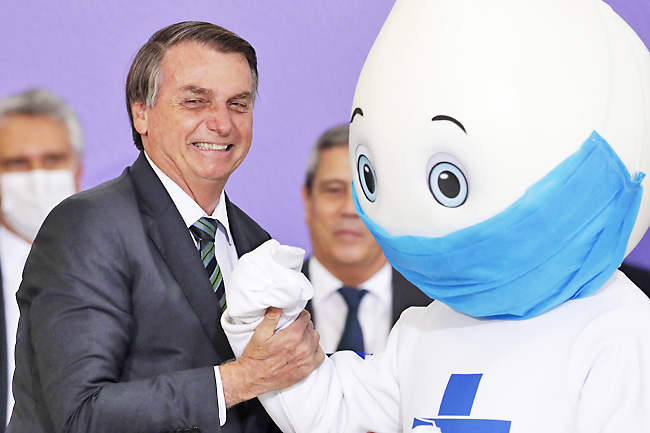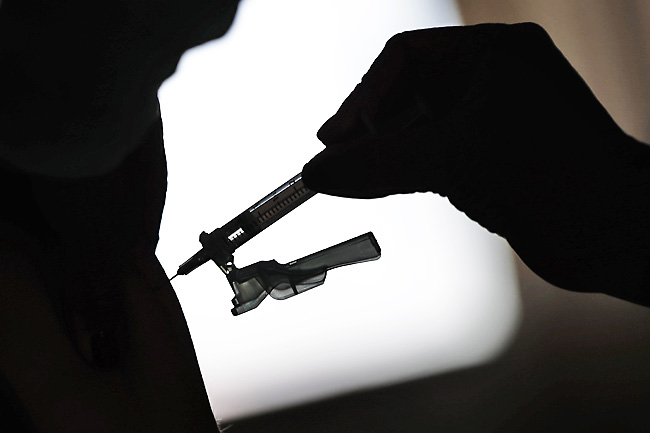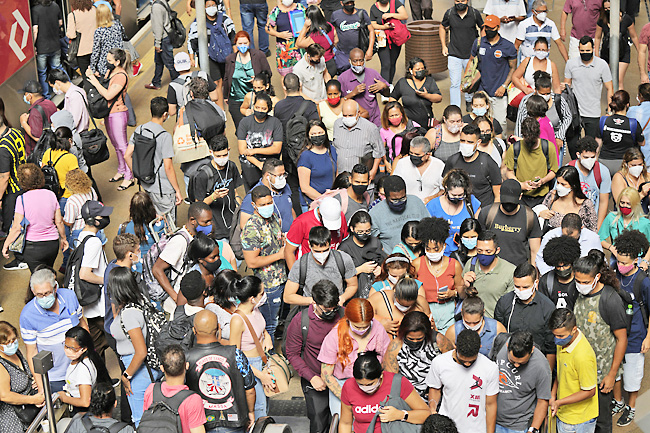Débora Álvares, Mauricio Savarese & Marcelo Silva De Sousa
BRASILIA, BRAZIL (AP) – As world leaders rely on public health specialists to inform their decisions about whether and how to vaccinate children against the coronavirus, Brazil’s government is asking the online public for guidance.
In recent weeks, President Jair Bolsonaro has staked out a position against immunising kids aged between five and 11, and his administration took the unusual step of creating a platform that could validate a stance that is widely opposed by experts. Since his government on December 23 unveiled its online questionnaire on the issue, the president’s supporters have been highly engaged on messaging apps trying to pressure parents to swing the results.
One widely shared post last Wednesday on the Telegram group ‘Bolsonaro Army’, which has about 37,000 members, said the vaccine is experimental and suggested that receiving shots could be more harmful than getting infected, although several studies have shown the opposite is true. It also included a link to the government’s survey, which other people were posting along with instructions to relay to friends and family.
The rally for resistance resembles online behaviour observed earlier this month, which catapulted Bolsonaro to the top of the heap in TIME magazine’s readers poll for Person of the Year, David Nemer, an expert on Brazil’s far-right groups on messaging apps, told The Associated Press (AP). Bolsonaro garnered about one-quarter of the more than nine million votes – nearly triple that of the runner-up, former United States (US) President Donald Trump. The magazine’s editors instead chose Elon Musk as 2021 Person of the Year.
This time, however, online efforts are aimed at something far more significant than bestowing an honorific on the president. The survey, which concluded on January 2, stands to shape vaccination policy in Latin America’s most populous nation, home to 20 million kids aged five to 11. Health Minister Marcelo Queiroga has said they will soon be eligible for vaccination, but survey results will help determine guidelines including whether shots could only be administered with parental consent and a doctor’s prescription.



“This is a tool of democracy, it widens the discussion on the topic and it will bring more ease for parents so they can take their children to immunise against COVID-19,” Queiroga said last Wednesday.
Health experts, for their part, are aghast. Some Brazilian states’ health secretariats have already pledged to ignore any health ministry guidelines on childhood vaccination if based on the public consultation. Founder and Director of Brazil’s health regulator between 1999 and 2003 Gonzalo Vecina said public consultation on vaccines is “unprecedented”.
“Bolsonaro is against the vaccine and his employee, the health minister, believes that health is a matter of public opinion. It is a spurious and nonsensical approach,” Vecina told the AP. “If only deniers send their opinion in the public consultation, is the government going to say that the vaccine doesn’t have to be used?”
Denialism from the top in Brazil is a bit of deja vu. Even as COVID-19 exploded, driving the nation’s death toll to the second highest in the world, Bolsonaro spent months sowing doubts about vaccines and was obstinate in his refusal to get a shot. He has cited the fact he contracted the coronavirus in 2020 to claim, incorrectly, that he is already immune, and routinely characterises vaccination as an issue of personal choice rather than a means for ensuring the common good.
So when Brazil’s health regulator authorised use of Pfizer’s shot for children on December 16, Bolsonaro was stunned.
“Kids are something very serious,” he said the same night in his weekly live broadcast on social media. “We don’t know about possible adverse future effects. It’s unbelievable – I’m sorry – what the agency did. Unbelievable.”
A study released last Thursday by US health authorities confirmed that serious side effects from the Pfizer vaccine in children ages five to 11 are rare. The findings were based on approximately eight million doses dispensed to youngsters in that age group.
Bolsonaro added that he would name and expose the public servants who issued the approval, prompting a union representing health agency workers to express concern about online abuse or even physical attacks.
Despite fervent support among his base, Bolsonaro’s anti-vaccine stance hasn’t gained as much traction in Brazil – which has a proud history of inoculation campaigns – as in the US. More than two-thirds of Brazilians are fully vaccinated, as compared to 63 per cent in the US, according to Johns Hopkins University’s vaccination tracker, though American children have been eligible for shots since early November.
In neighbouring Argentina, the government has allowed kids 12 years and older to be vaccinated since August, and more recently began giving shots to children as young as three. In the face of subsequent criticism, the nation’s Health Ministry cited the recommendation of the nation’s association of pediatricians.
In Chile, two-thirds of kids aged between three and 17 have already received both their shots, after the nation’s health regulator analysed an immunisation study of 100 million children.
For the time being, Mexico isn’t vaccinating children except those 12 years or older with illnesses that put them at greater risk. Mexico’s point man for the pandemic, Hugo López-Gatell said yesterday the World Health Organization (WHO) hasn’t recommended vaccinating children aged five to 11, and that countries with ample vaccine coverage, like Mexico, shouldn’t vaccinate kids until developing nations with limited coverage can raise their adult vaccination rates.
In Brazil, General Director of prominent pollster Datafolha Mauro Paulino said one problem with the Bolsonaro government’s survey is the way questions are framed, repeatedly asking interviewees, “Do you agree that…?” Such failure to present questions neutrally can induce responses.
“Datafolha always gives the two possible alternatives: whether the interviewee agrees or disagrees with the statement,” he said. “Both sides of the question are necessary.”


